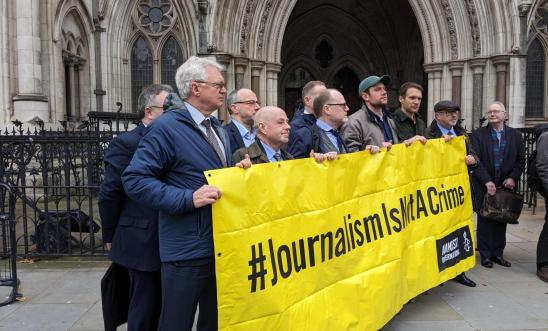
Press releases
UK: Secret tribunal on journalist surveillance is 'test case for press freedom'

Investigatory Powers Tribunal for journalists Trevor Birney and Barry McCaffrey starts today
London court hearing looking into claims the two Belfast journalists were secretly monitored by UK authorities
Case will test legal safeguards for all UK journalists against unwarranted surveillance and right to protect sources
‘Make no mistake, this is a test case for press freedom in the UK’ – Patrick Corrigan, Amnesty International
The Investigatory Powers Tribunal (IPT) will examine a complaint by two journalists who asked it to find out whether police in Northern Ireland and Durham used intrusive surveillance powers against them. The tribunal starts today and ends tomorrow (28/29 February) at the Royal Courts of Justice in London.
The journalists, Trevor Birney and Barry McCaffrey, were arrested in 2018 in connection to their work investigating the 1994 Loughinisland massacre.
The pair filed a complaint with the IPT after a court in Belfast ruled the 2018 search warrants and arrests were unlawful. Last year, it emerged that the tribunal had discovered the PSNI had previously accessed Mr McCaffrey’s phone while he was investigating potential corruption in the force.
The journalists hope the IPT hearing will reveal the full extent of the covert and intrusive surveillance used against them by the police and other state authorities.
Amnesty International is attending the hearing and is encouraging journalists in Northern Ireland, who may be concerned that they too have been subjected to covert surveillance, to lodge complaints with the IPT and submit freedom of information requests and subject access requests to the PSNI.
Patrick Corrigan, Amnesty International’s Northern Ireland director, said:
“It’s high time that the police answer serious questions about the secret surveillance of journalists in Northern Ireland.
“The police in Northern Ireland continue to trample on press freedom despite Courts finding that police have ridden roughshod over the human rights of journalists and their right to protect sources.
“We are extremely concerned that the revelations in this particular case point to a much wider pattern of covert police surveillance of journalists and other human rights defenders.
“We now need full disclosure of the extent of secret surveillance against journalists and an end to the practice of treating reporters as criminal suspects.
“Make no mistake, this is a test case for press freedom in the UK.”